Unilever: Organisational Behaviour, Teamwork and Motivation Analysis
VerifiedAdded on 2023/06/05
|14
|4426
|450
Report
AI Summary
This report provides an analysis of organisational behaviour within Unilever, a multinational FMCG company. It explores the influence of organisational culture, politics, and power on employee behaviour and performance, referencing Charles Handy's model and French & Raven's Bases of Power. The report evaluates content and process theories of motivation, including Maslow's hierarchy of needs, McClelland's need theory, equity theory, and goal-setting theory, and their application in achieving organisational goals. It differentiates between effective and ineffective teams, highlighting the importance of teamwork for Unilever's success. The report applies organisational behaviour concepts and philosophies within an organisational context, assessing the merits of teamwork and the mix of knowledge, experience, and skills crucial for organisational function.
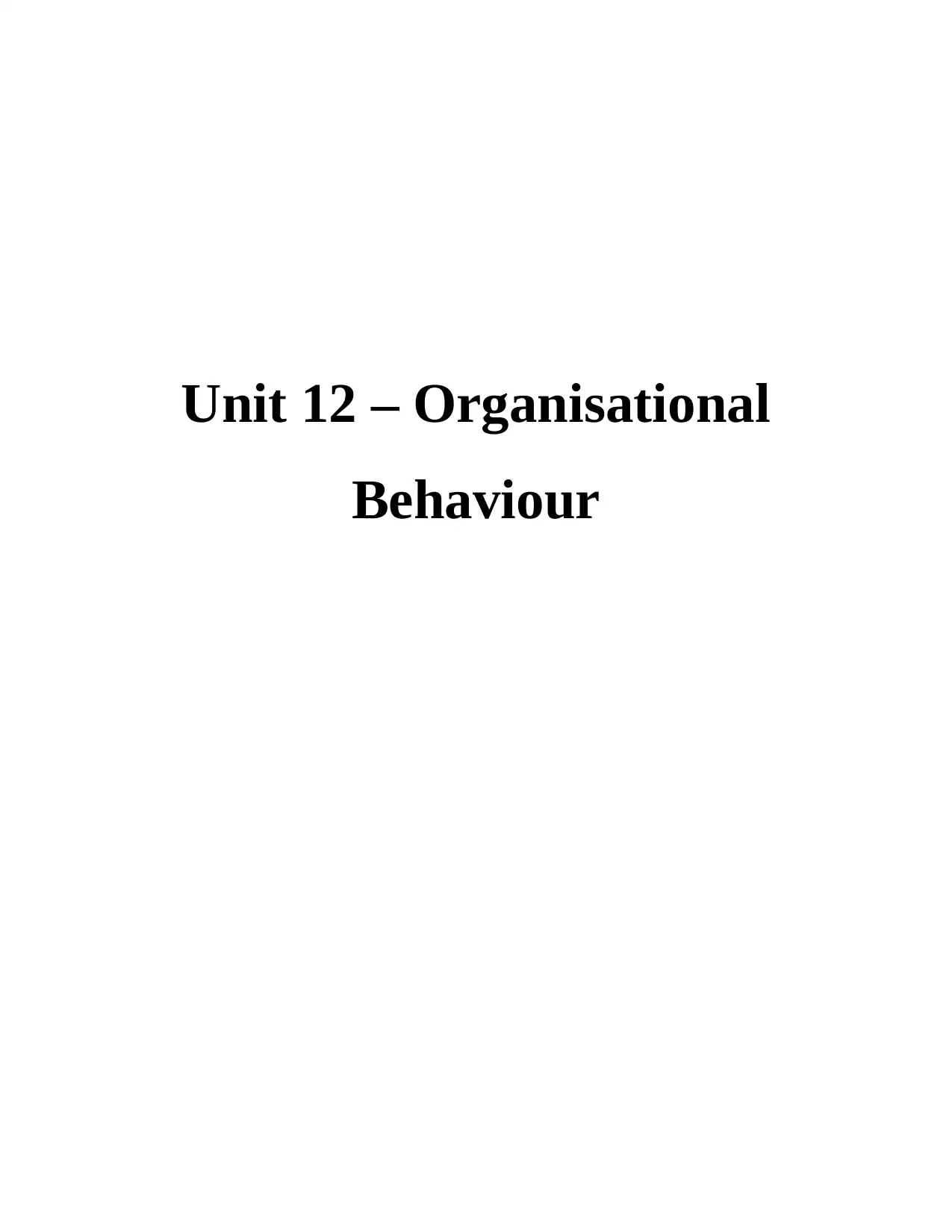
Unit 12 – Organisational
Behaviour
Behaviour
Paraphrase This Document
Need a fresh take? Get an instant paraphrase of this document with our AI Paraphraser
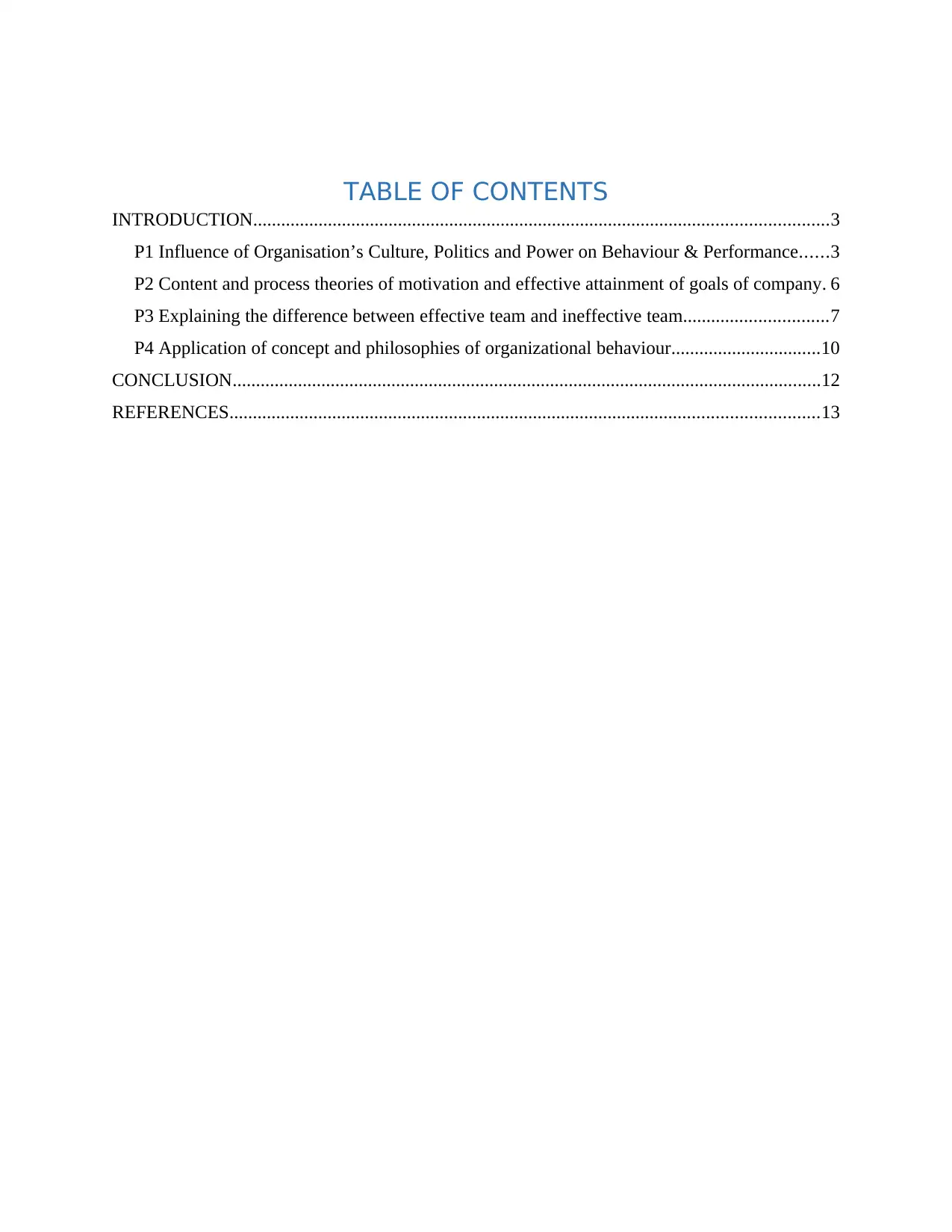
TABLE OF CONTENTS
INTRODUCTION...........................................................................................................................3
P1 Influence of Organisation’s Culture, Politics and Power on Behaviour & Performance......3
P2 Content and process theories of motivation and effective attainment of goals of company. 6
P3 Explaining the difference between effective team and ineffective team...............................7
P4 Application of concept and philosophies of organizational behaviour................................10
CONCLUSION..............................................................................................................................12
REFERENCES..............................................................................................................................13
INTRODUCTION...........................................................................................................................3
P1 Influence of Organisation’s Culture, Politics and Power on Behaviour & Performance......3
P2 Content and process theories of motivation and effective attainment of goals of company. 6
P3 Explaining the difference between effective team and ineffective team...............................7
P4 Application of concept and philosophies of organizational behaviour................................10
CONCLUSION..............................................................................................................................12
REFERENCES..............................................................................................................................13
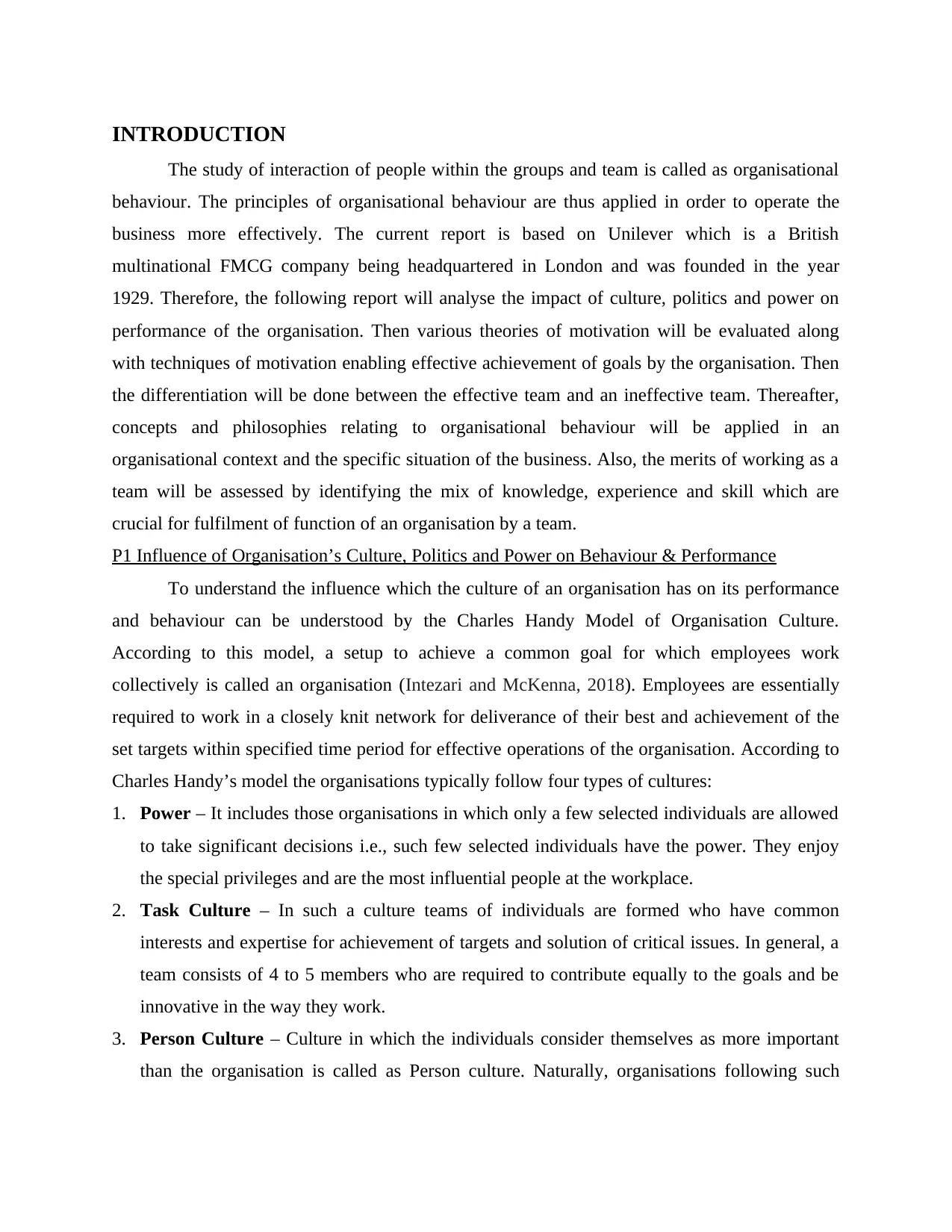
INTRODUCTION
The study of interaction of people within the groups and team is called as organisational
behaviour. The principles of organisational behaviour are thus applied in order to operate the
business more effectively. The current report is based on Unilever which is a British
multinational FMCG company being headquartered in London and was founded in the year
1929. Therefore, the following report will analyse the impact of culture, politics and power on
performance of the organisation. Then various theories of motivation will be evaluated along
with techniques of motivation enabling effective achievement of goals by the organisation. Then
the differentiation will be done between the effective team and an ineffective team. Thereafter,
concepts and philosophies relating to organisational behaviour will be applied in an
organisational context and the specific situation of the business. Also, the merits of working as a
team will be assessed by identifying the mix of knowledge, experience and skill which are
crucial for fulfilment of function of an organisation by a team.
P1 Influence of Organisation’s Culture, Politics and Power on Behaviour & Performance
To understand the influence which the culture of an organisation has on its performance
and behaviour can be understood by the Charles Handy Model of Organisation Culture.
According to this model, a setup to achieve a common goal for which employees work
collectively is called an organisation (Intezari and McKenna, 2018). Employees are essentially
required to work in a closely knit network for deliverance of their best and achievement of the
set targets within specified time period for effective operations of the organisation. According to
Charles Handy’s model the organisations typically follow four types of cultures:
1. Power – It includes those organisations in which only a few selected individuals are allowed
to take significant decisions i.e., such few selected individuals have the power. They enjoy
the special privileges and are the most influential people at the workplace.
2. Task Culture – In such a culture teams of individuals are formed who have common
interests and expertise for achievement of targets and solution of critical issues. In general, a
team consists of 4 to 5 members who are required to contribute equally to the goals and be
innovative in the way they work.
3. Person Culture – Culture in which the individuals consider themselves as more important
than the organisation is called as Person culture. Naturally, organisations following such
The study of interaction of people within the groups and team is called as organisational
behaviour. The principles of organisational behaviour are thus applied in order to operate the
business more effectively. The current report is based on Unilever which is a British
multinational FMCG company being headquartered in London and was founded in the year
1929. Therefore, the following report will analyse the impact of culture, politics and power on
performance of the organisation. Then various theories of motivation will be evaluated along
with techniques of motivation enabling effective achievement of goals by the organisation. Then
the differentiation will be done between the effective team and an ineffective team. Thereafter,
concepts and philosophies relating to organisational behaviour will be applied in an
organisational context and the specific situation of the business. Also, the merits of working as a
team will be assessed by identifying the mix of knowledge, experience and skill which are
crucial for fulfilment of function of an organisation by a team.
P1 Influence of Organisation’s Culture, Politics and Power on Behaviour & Performance
To understand the influence which the culture of an organisation has on its performance
and behaviour can be understood by the Charles Handy Model of Organisation Culture.
According to this model, a setup to achieve a common goal for which employees work
collectively is called an organisation (Intezari and McKenna, 2018). Employees are essentially
required to work in a closely knit network for deliverance of their best and achievement of the
set targets within specified time period for effective operations of the organisation. According to
Charles Handy’s model the organisations typically follow four types of cultures:
1. Power – It includes those organisations in which only a few selected individuals are allowed
to take significant decisions i.e., such few selected individuals have the power. They enjoy
the special privileges and are the most influential people at the workplace.
2. Task Culture – In such a culture teams of individuals are formed who have common
interests and expertise for achievement of targets and solution of critical issues. In general, a
team consists of 4 to 5 members who are required to contribute equally to the goals and be
innovative in the way they work.
3. Person Culture – Culture in which the individuals consider themselves as more important
than the organisation is called as Person culture. Naturally, organisations following such
⊘ This is a preview!⊘
Do you want full access?
Subscribe today to unlock all pages.

Trusted by 1+ million students worldwide
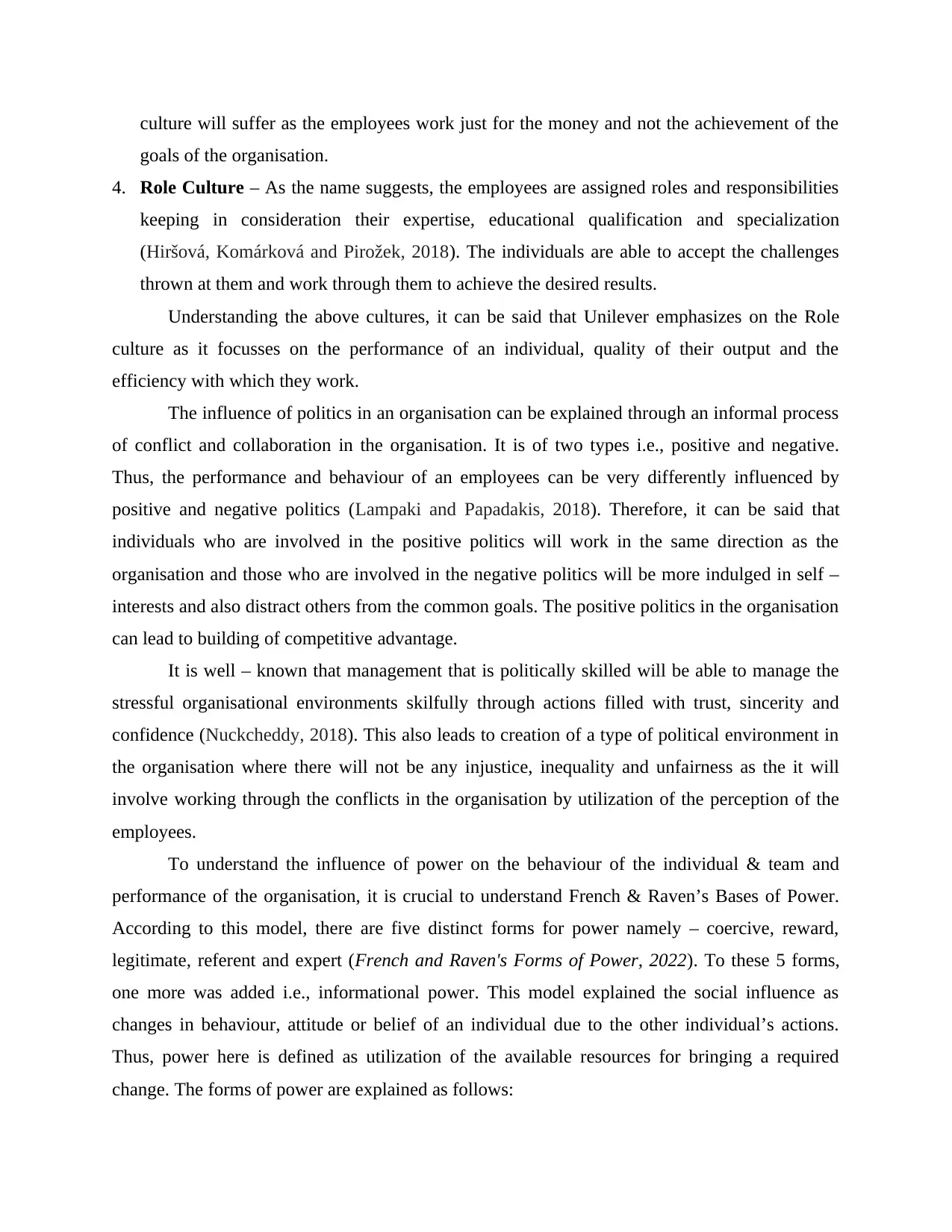
culture will suffer as the employees work just for the money and not the achievement of the
goals of the organisation.
4. Role Culture – As the name suggests, the employees are assigned roles and responsibilities
keeping in consideration their expertise, educational qualification and specialization
(Hiršová, Komárková and Pirožek, 2018). The individuals are able to accept the challenges
thrown at them and work through them to achieve the desired results.
Understanding the above cultures, it can be said that Unilever emphasizes on the Role
culture as it focusses on the performance of an individual, quality of their output and the
efficiency with which they work.
The influence of politics in an organisation can be explained through an informal process
of conflict and collaboration in the organisation. It is of two types i.e., positive and negative.
Thus, the performance and behaviour of an employees can be very differently influenced by
positive and negative politics (Lampaki and Papadakis, 2018). Therefore, it can be said that
individuals who are involved in the positive politics will work in the same direction as the
organisation and those who are involved in the negative politics will be more indulged in self –
interests and also distract others from the common goals. The positive politics in the organisation
can lead to building of competitive advantage.
It is well – known that management that is politically skilled will be able to manage the
stressful organisational environments skilfully through actions filled with trust, sincerity and
confidence (Nuckcheddy, 2018). This also leads to creation of a type of political environment in
the organisation where there will not be any injustice, inequality and unfairness as the it will
involve working through the conflicts in the organisation by utilization of the perception of the
employees.
To understand the influence of power on the behaviour of the individual & team and
performance of the organisation, it is crucial to understand French & Raven’s Bases of Power.
According to this model, there are five distinct forms for power namely – coercive, reward,
legitimate, referent and expert (French and Raven's Forms of Power, 2022). To these 5 forms,
one more was added i.e., informational power. This model explained the social influence as
changes in behaviour, attitude or belief of an individual due to the other individual’s actions.
Thus, power here is defined as utilization of the available resources for bringing a required
change. The forms of power are explained as follows:
goals of the organisation.
4. Role Culture – As the name suggests, the employees are assigned roles and responsibilities
keeping in consideration their expertise, educational qualification and specialization
(Hiršová, Komárková and Pirožek, 2018). The individuals are able to accept the challenges
thrown at them and work through them to achieve the desired results.
Understanding the above cultures, it can be said that Unilever emphasizes on the Role
culture as it focusses on the performance of an individual, quality of their output and the
efficiency with which they work.
The influence of politics in an organisation can be explained through an informal process
of conflict and collaboration in the organisation. It is of two types i.e., positive and negative.
Thus, the performance and behaviour of an employees can be very differently influenced by
positive and negative politics (Lampaki and Papadakis, 2018). Therefore, it can be said that
individuals who are involved in the positive politics will work in the same direction as the
organisation and those who are involved in the negative politics will be more indulged in self –
interests and also distract others from the common goals. The positive politics in the organisation
can lead to building of competitive advantage.
It is well – known that management that is politically skilled will be able to manage the
stressful organisational environments skilfully through actions filled with trust, sincerity and
confidence (Nuckcheddy, 2018). This also leads to creation of a type of political environment in
the organisation where there will not be any injustice, inequality and unfairness as the it will
involve working through the conflicts in the organisation by utilization of the perception of the
employees.
To understand the influence of power on the behaviour of the individual & team and
performance of the organisation, it is crucial to understand French & Raven’s Bases of Power.
According to this model, there are five distinct forms for power namely – coercive, reward,
legitimate, referent and expert (French and Raven's Forms of Power, 2022). To these 5 forms,
one more was added i.e., informational power. This model explained the social influence as
changes in behaviour, attitude or belief of an individual due to the other individual’s actions.
Thus, power here is defined as utilization of the available resources for bringing a required
change. The forms of power are explained as follows:
Paraphrase This Document
Need a fresh take? Get an instant paraphrase of this document with our AI Paraphraser
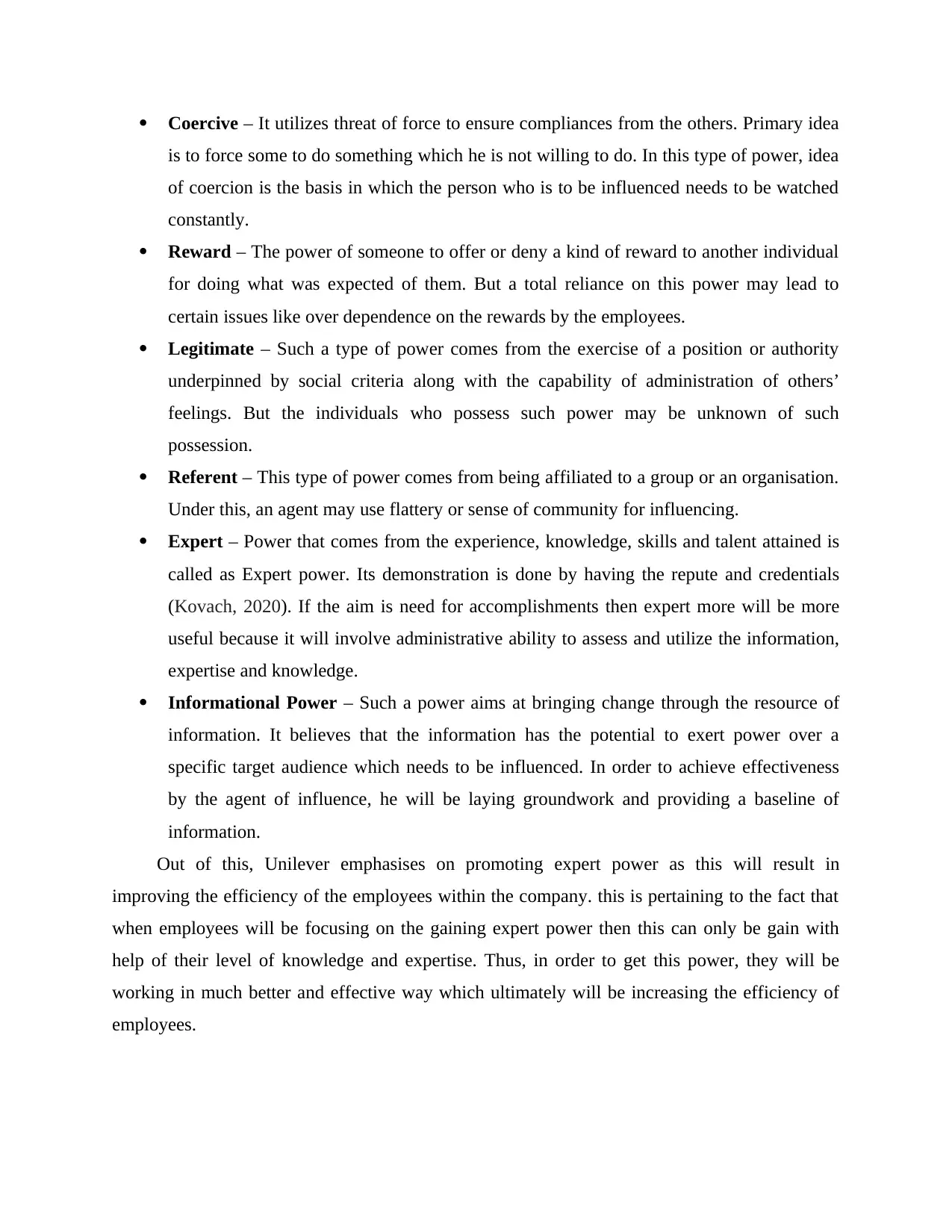
Coercive – It utilizes threat of force to ensure compliances from the others. Primary idea
is to force some to do something which he is not willing to do. In this type of power, idea
of coercion is the basis in which the person who is to be influenced needs to be watched
constantly.
Reward – The power of someone to offer or deny a kind of reward to another individual
for doing what was expected of them. But a total reliance on this power may lead to
certain issues like over dependence on the rewards by the employees.
Legitimate – Such a type of power comes from the exercise of a position or authority
underpinned by social criteria along with the capability of administration of others’
feelings. But the individuals who possess such power may be unknown of such
possession.
Referent – This type of power comes from being affiliated to a group or an organisation.
Under this, an agent may use flattery or sense of community for influencing.
Expert – Power that comes from the experience, knowledge, skills and talent attained is
called as Expert power. Its demonstration is done by having the repute and credentials
(Kovach, 2020). If the aim is need for accomplishments then expert more will be more
useful because it will involve administrative ability to assess and utilize the information,
expertise and knowledge.
Informational Power – Such a power aims at bringing change through the resource of
information. It believes that the information has the potential to exert power over a
specific target audience which needs to be influenced. In order to achieve effectiveness
by the agent of influence, he will be laying groundwork and providing a baseline of
information.
Out of this, Unilever emphasises on promoting expert power as this will result in
improving the efficiency of the employees within the company. this is pertaining to the fact that
when employees will be focusing on the gaining expert power then this can only be gain with
help of their level of knowledge and expertise. Thus, in order to get this power, they will be
working in much better and effective way which ultimately will be increasing the efficiency of
employees.
is to force some to do something which he is not willing to do. In this type of power, idea
of coercion is the basis in which the person who is to be influenced needs to be watched
constantly.
Reward – The power of someone to offer or deny a kind of reward to another individual
for doing what was expected of them. But a total reliance on this power may lead to
certain issues like over dependence on the rewards by the employees.
Legitimate – Such a type of power comes from the exercise of a position or authority
underpinned by social criteria along with the capability of administration of others’
feelings. But the individuals who possess such power may be unknown of such
possession.
Referent – This type of power comes from being affiliated to a group or an organisation.
Under this, an agent may use flattery or sense of community for influencing.
Expert – Power that comes from the experience, knowledge, skills and talent attained is
called as Expert power. Its demonstration is done by having the repute and credentials
(Kovach, 2020). If the aim is need for accomplishments then expert more will be more
useful because it will involve administrative ability to assess and utilize the information,
expertise and knowledge.
Informational Power – Such a power aims at bringing change through the resource of
information. It believes that the information has the potential to exert power over a
specific target audience which needs to be influenced. In order to achieve effectiveness
by the agent of influence, he will be laying groundwork and providing a baseline of
information.
Out of this, Unilever emphasises on promoting expert power as this will result in
improving the efficiency of the employees within the company. this is pertaining to the fact that
when employees will be focusing on the gaining expert power then this can only be gain with
help of their level of knowledge and expertise. Thus, in order to get this power, they will be
working in much better and effective way which ultimately will be increasing the efficiency of
employees.
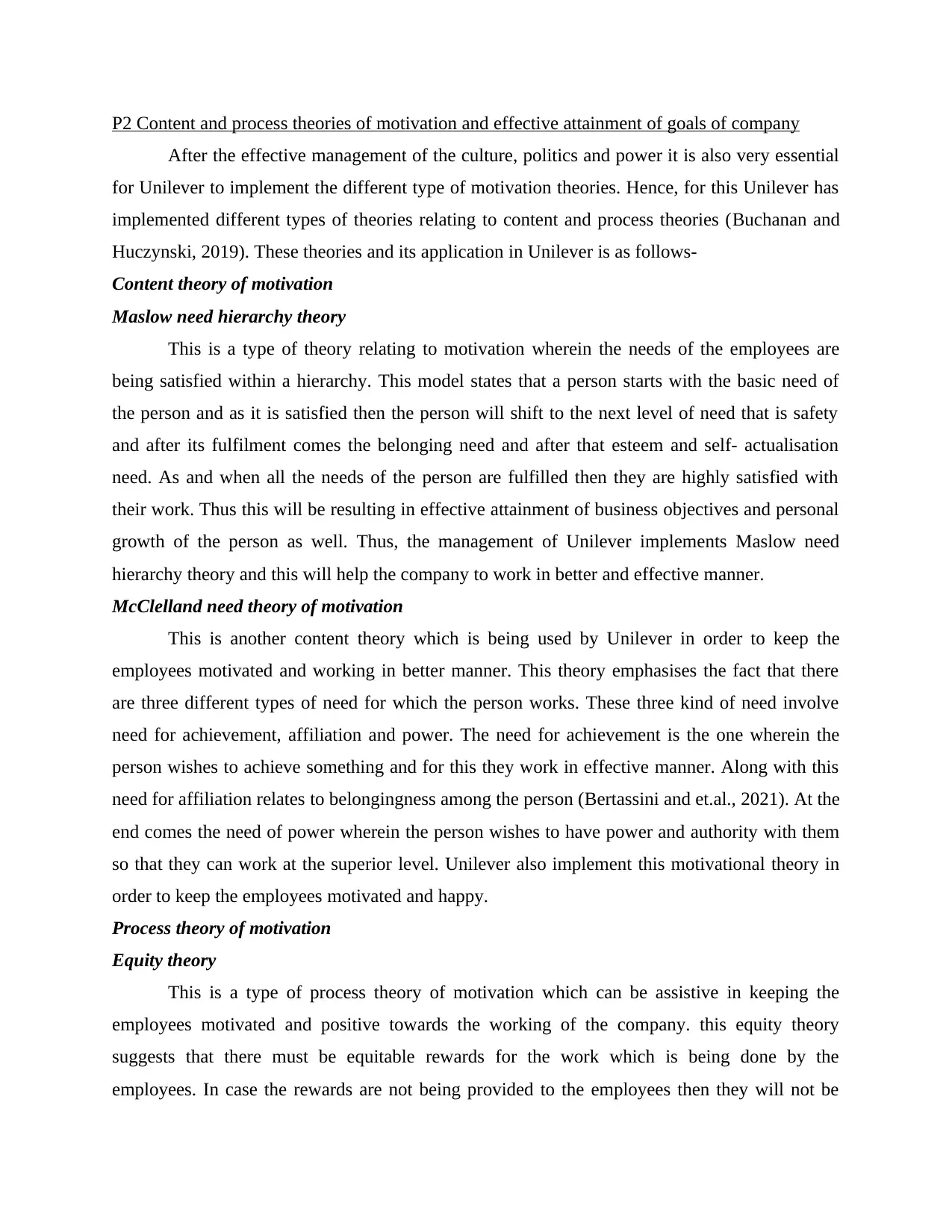
P2 Content and process theories of motivation and effective attainment of goals of company
After the effective management of the culture, politics and power it is also very essential
for Unilever to implement the different type of motivation theories. Hence, for this Unilever has
implemented different types of theories relating to content and process theories (Buchanan and
Huczynski, 2019). These theories and its application in Unilever is as follows-
Content theory of motivation
Maslow need hierarchy theory
This is a type of theory relating to motivation wherein the needs of the employees are
being satisfied within a hierarchy. This model states that a person starts with the basic need of
the person and as it is satisfied then the person will shift to the next level of need that is safety
and after its fulfilment comes the belonging need and after that esteem and self- actualisation
need. As and when all the needs of the person are fulfilled then they are highly satisfied with
their work. Thus this will be resulting in effective attainment of business objectives and personal
growth of the person as well. Thus, the management of Unilever implements Maslow need
hierarchy theory and this will help the company to work in better and effective manner.
McClelland need theory of motivation
This is another content theory which is being used by Unilever in order to keep the
employees motivated and working in better manner. This theory emphasises the fact that there
are three different types of need for which the person works. These three kind of need involve
need for achievement, affiliation and power. The need for achievement is the one wherein the
person wishes to achieve something and for this they work in effective manner. Along with this
need for affiliation relates to belongingness among the person (Bertassini and et.al., 2021). At the
end comes the need of power wherein the person wishes to have power and authority with them
so that they can work at the superior level. Unilever also implement this motivational theory in
order to keep the employees motivated and happy.
Process theory of motivation
Equity theory
This is a type of process theory of motivation which can be assistive in keeping the
employees motivated and positive towards the working of the company. this equity theory
suggests that there must be equitable rewards for the work which is being done by the
employees. In case the rewards are not being provided to the employees then they will not be
After the effective management of the culture, politics and power it is also very essential
for Unilever to implement the different type of motivation theories. Hence, for this Unilever has
implemented different types of theories relating to content and process theories (Buchanan and
Huczynski, 2019). These theories and its application in Unilever is as follows-
Content theory of motivation
Maslow need hierarchy theory
This is a type of theory relating to motivation wherein the needs of the employees are
being satisfied within a hierarchy. This model states that a person starts with the basic need of
the person and as it is satisfied then the person will shift to the next level of need that is safety
and after its fulfilment comes the belonging need and after that esteem and self- actualisation
need. As and when all the needs of the person are fulfilled then they are highly satisfied with
their work. Thus this will be resulting in effective attainment of business objectives and personal
growth of the person as well. Thus, the management of Unilever implements Maslow need
hierarchy theory and this will help the company to work in better and effective manner.
McClelland need theory of motivation
This is another content theory which is being used by Unilever in order to keep the
employees motivated and working in better manner. This theory emphasises the fact that there
are three different types of need for which the person works. These three kind of need involve
need for achievement, affiliation and power. The need for achievement is the one wherein the
person wishes to achieve something and for this they work in effective manner. Along with this
need for affiliation relates to belongingness among the person (Bertassini and et.al., 2021). At the
end comes the need of power wherein the person wishes to have power and authority with them
so that they can work at the superior level. Unilever also implement this motivational theory in
order to keep the employees motivated and happy.
Process theory of motivation
Equity theory
This is a type of process theory of motivation which can be assistive in keeping the
employees motivated and positive towards the working of the company. this equity theory
suggests that there must be equitable rewards for the work which is being done by the
employees. In case the rewards are not being provided to the employees then they will not be
⊘ This is a preview!⊘
Do you want full access?
Subscribe today to unlock all pages.

Trusted by 1+ million students worldwide
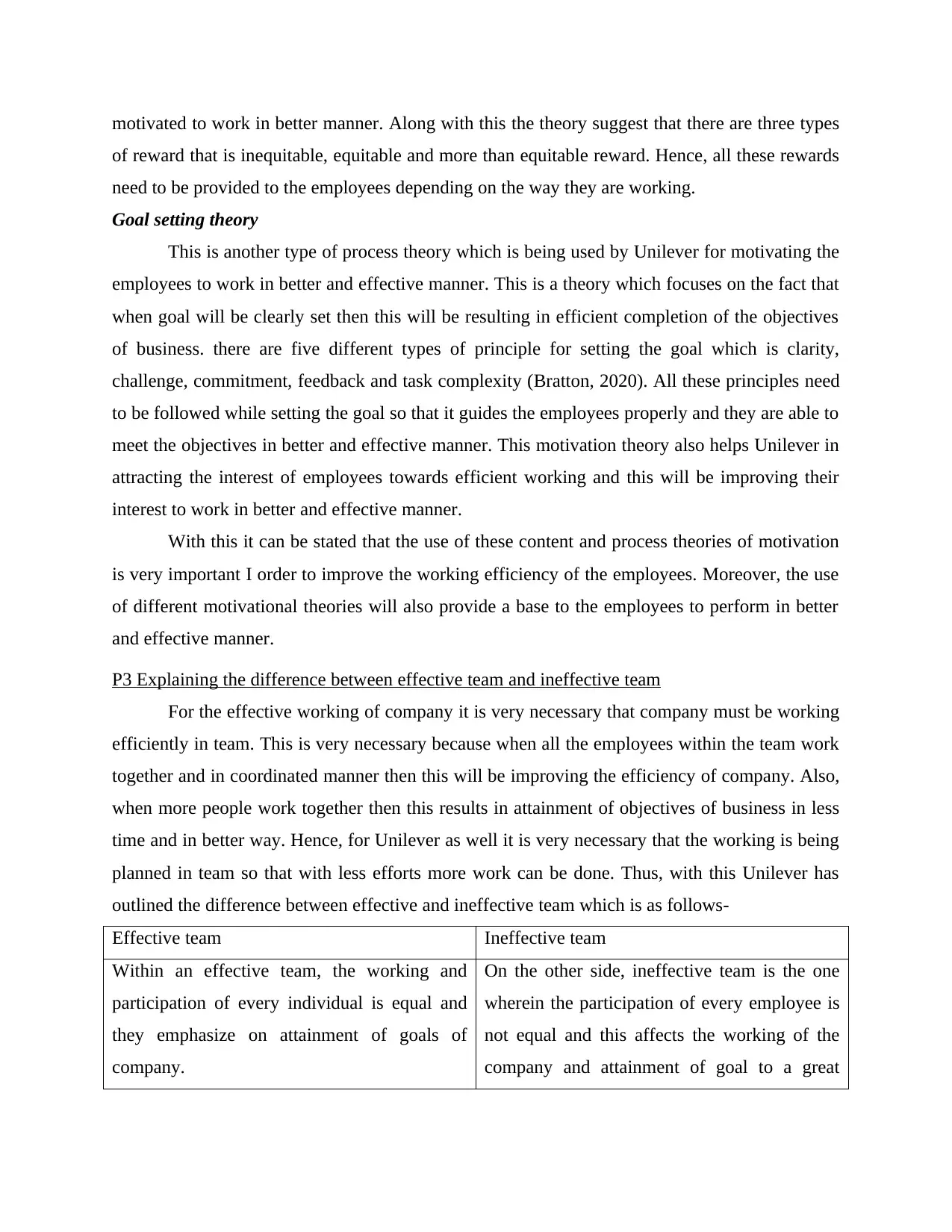
motivated to work in better manner. Along with this the theory suggest that there are three types
of reward that is inequitable, equitable and more than equitable reward. Hence, all these rewards
need to be provided to the employees depending on the way they are working.
Goal setting theory
This is another type of process theory which is being used by Unilever for motivating the
employees to work in better and effective manner. This is a theory which focuses on the fact that
when goal will be clearly set then this will be resulting in efficient completion of the objectives
of business. there are five different types of principle for setting the goal which is clarity,
challenge, commitment, feedback and task complexity (Bratton, 2020). All these principles need
to be followed while setting the goal so that it guides the employees properly and they are able to
meet the objectives in better and effective manner. This motivation theory also helps Unilever in
attracting the interest of employees towards efficient working and this will be improving their
interest to work in better and effective manner.
With this it can be stated that the use of these content and process theories of motivation
is very important I order to improve the working efficiency of the employees. Moreover, the use
of different motivational theories will also provide a base to the employees to perform in better
and effective manner.
P3 Explaining the difference between effective team and ineffective team
For the effective working of company it is very necessary that company must be working
efficiently in team. This is very necessary because when all the employees within the team work
together and in coordinated manner then this will be improving the efficiency of company. Also,
when more people work together then this results in attainment of objectives of business in less
time and in better way. Hence, for Unilever as well it is very necessary that the working is being
planned in team so that with less efforts more work can be done. Thus, with this Unilever has
outlined the difference between effective and ineffective team which is as follows-
Effective team Ineffective team
Within an effective team, the working and
participation of every individual is equal and
they emphasize on attainment of goals of
company.
On the other side, ineffective team is the one
wherein the participation of every employee is
not equal and this affects the working of the
company and attainment of goal to a great
of reward that is inequitable, equitable and more than equitable reward. Hence, all these rewards
need to be provided to the employees depending on the way they are working.
Goal setting theory
This is another type of process theory which is being used by Unilever for motivating the
employees to work in better and effective manner. This is a theory which focuses on the fact that
when goal will be clearly set then this will be resulting in efficient completion of the objectives
of business. there are five different types of principle for setting the goal which is clarity,
challenge, commitment, feedback and task complexity (Bratton, 2020). All these principles need
to be followed while setting the goal so that it guides the employees properly and they are able to
meet the objectives in better and effective manner. This motivation theory also helps Unilever in
attracting the interest of employees towards efficient working and this will be improving their
interest to work in better and effective manner.
With this it can be stated that the use of these content and process theories of motivation
is very important I order to improve the working efficiency of the employees. Moreover, the use
of different motivational theories will also provide a base to the employees to perform in better
and effective manner.
P3 Explaining the difference between effective team and ineffective team
For the effective working of company it is very necessary that company must be working
efficiently in team. This is very necessary because when all the employees within the team work
together and in coordinated manner then this will be improving the efficiency of company. Also,
when more people work together then this results in attainment of objectives of business in less
time and in better way. Hence, for Unilever as well it is very necessary that the working is being
planned in team so that with less efforts more work can be done. Thus, with this Unilever has
outlined the difference between effective and ineffective team which is as follows-
Effective team Ineffective team
Within an effective team, the working and
participation of every individual is equal and
they emphasize on attainment of goals of
company.
On the other side, ineffective team is the one
wherein the participation of every employee is
not equal and this affects the working of the
company and attainment of goal to a great
Paraphrase This Document
Need a fresh take? Get an instant paraphrase of this document with our AI Paraphraser
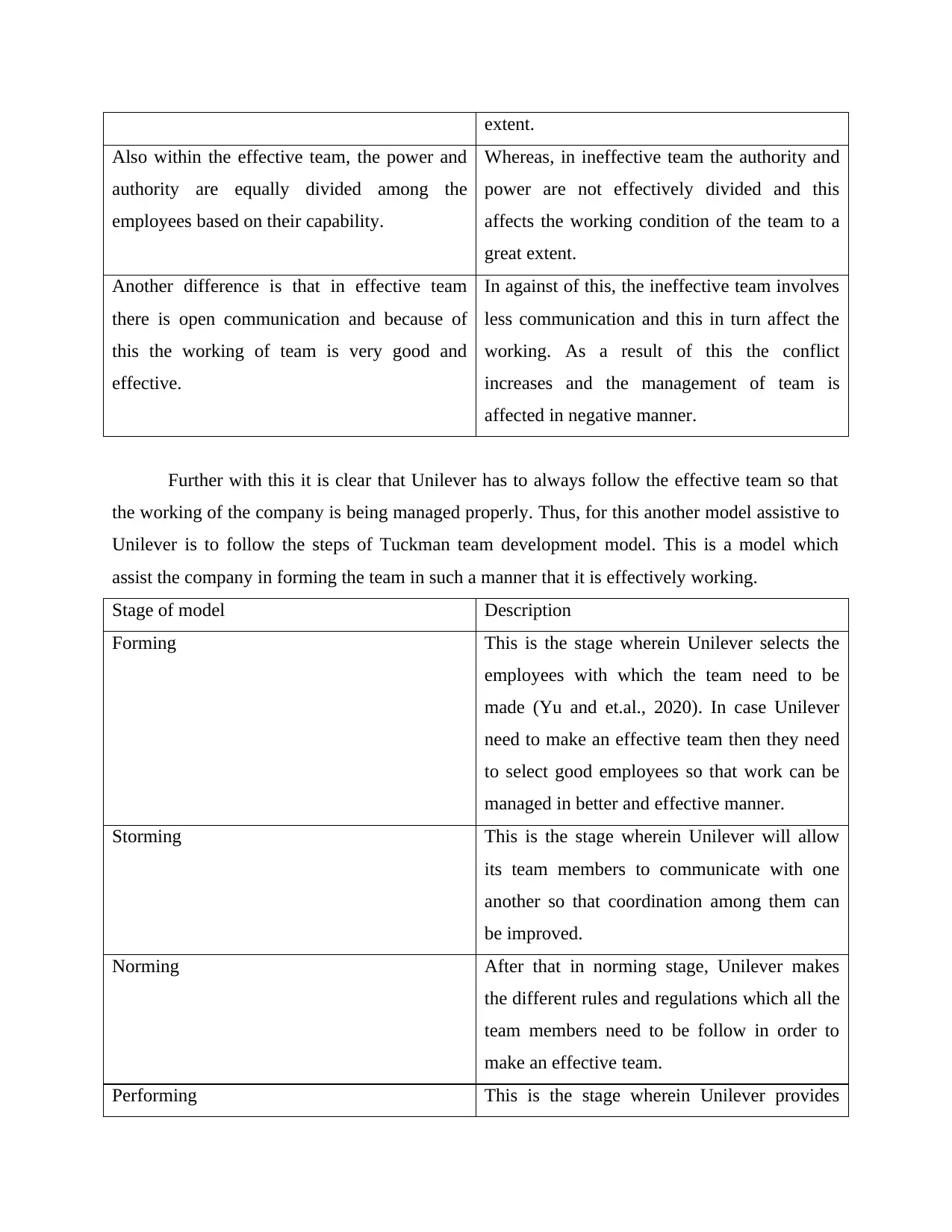
extent.
Also within the effective team, the power and
authority are equally divided among the
employees based on their capability.
Whereas, in ineffective team the authority and
power are not effectively divided and this
affects the working condition of the team to a
great extent.
Another difference is that in effective team
there is open communication and because of
this the working of team is very good and
effective.
In against of this, the ineffective team involves
less communication and this in turn affect the
working. As a result of this the conflict
increases and the management of team is
affected in negative manner.
Further with this it is clear that Unilever has to always follow the effective team so that
the working of the company is being managed properly. Thus, for this another model assistive to
Unilever is to follow the steps of Tuckman team development model. This is a model which
assist the company in forming the team in such a manner that it is effectively working.
Stage of model Description
Forming This is the stage wherein Unilever selects the
employees with which the team need to be
made (Yu and et.al., 2020). In case Unilever
need to make an effective team then they need
to select good employees so that work can be
managed in better and effective manner.
Storming This is the stage wherein Unilever will allow
its team members to communicate with one
another so that coordination among them can
be improved.
Norming After that in norming stage, Unilever makes
the different rules and regulations which all the
team members need to be follow in order to
make an effective team.
Performing This is the stage wherein Unilever provides
Also within the effective team, the power and
authority are equally divided among the
employees based on their capability.
Whereas, in ineffective team the authority and
power are not effectively divided and this
affects the working condition of the team to a
great extent.
Another difference is that in effective team
there is open communication and because of
this the working of team is very good and
effective.
In against of this, the ineffective team involves
less communication and this in turn affect the
working. As a result of this the conflict
increases and the management of team is
affected in negative manner.
Further with this it is clear that Unilever has to always follow the effective team so that
the working of the company is being managed properly. Thus, for this another model assistive to
Unilever is to follow the steps of Tuckman team development model. This is a model which
assist the company in forming the team in such a manner that it is effectively working.
Stage of model Description
Forming This is the stage wherein Unilever selects the
employees with which the team need to be
made (Yu and et.al., 2020). In case Unilever
need to make an effective team then they need
to select good employees so that work can be
managed in better and effective manner.
Storming This is the stage wherein Unilever will allow
its team members to communicate with one
another so that coordination among them can
be improved.
Norming After that in norming stage, Unilever makes
the different rules and regulations which all the
team members need to be follow in order to
make an effective team.
Performing This is the stage wherein Unilever provides
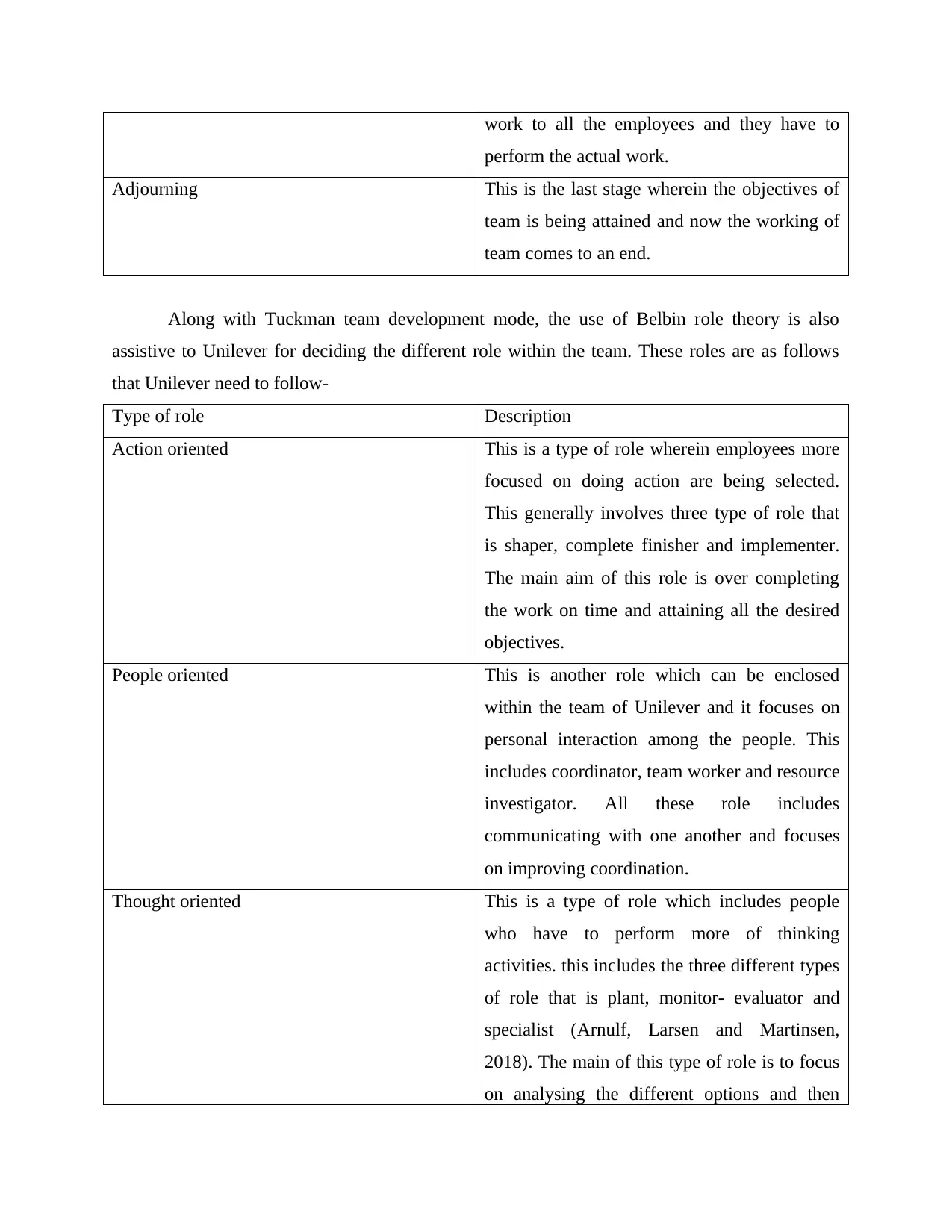
work to all the employees and they have to
perform the actual work.
Adjourning This is the last stage wherein the objectives of
team is being attained and now the working of
team comes to an end.
Along with Tuckman team development mode, the use of Belbin role theory is also
assistive to Unilever for deciding the different role within the team. These roles are as follows
that Unilever need to follow-
Type of role Description
Action oriented This is a type of role wherein employees more
focused on doing action are being selected.
This generally involves three type of role that
is shaper, complete finisher and implementer.
The main aim of this role is over completing
the work on time and attaining all the desired
objectives.
People oriented This is another role which can be enclosed
within the team of Unilever and it focuses on
personal interaction among the people. This
includes coordinator, team worker and resource
investigator. All these role includes
communicating with one another and focuses
on improving coordination.
Thought oriented This is a type of role which includes people
who have to perform more of thinking
activities. this includes the three different types
of role that is plant, monitor- evaluator and
specialist (Arnulf, Larsen and Martinsen,
2018). The main of this type of role is to focus
on analysing the different options and then
perform the actual work.
Adjourning This is the last stage wherein the objectives of
team is being attained and now the working of
team comes to an end.
Along with Tuckman team development mode, the use of Belbin role theory is also
assistive to Unilever for deciding the different role within the team. These roles are as follows
that Unilever need to follow-
Type of role Description
Action oriented This is a type of role wherein employees more
focused on doing action are being selected.
This generally involves three type of role that
is shaper, complete finisher and implementer.
The main aim of this role is over completing
the work on time and attaining all the desired
objectives.
People oriented This is another role which can be enclosed
within the team of Unilever and it focuses on
personal interaction among the people. This
includes coordinator, team worker and resource
investigator. All these role includes
communicating with one another and focuses
on improving coordination.
Thought oriented This is a type of role which includes people
who have to perform more of thinking
activities. this includes the three different types
of role that is plant, monitor- evaluator and
specialist (Arnulf, Larsen and Martinsen,
2018). The main of this type of role is to focus
on analysing the different options and then
⊘ This is a preview!⊘
Do you want full access?
Subscribe today to unlock all pages.

Trusted by 1+ million students worldwide
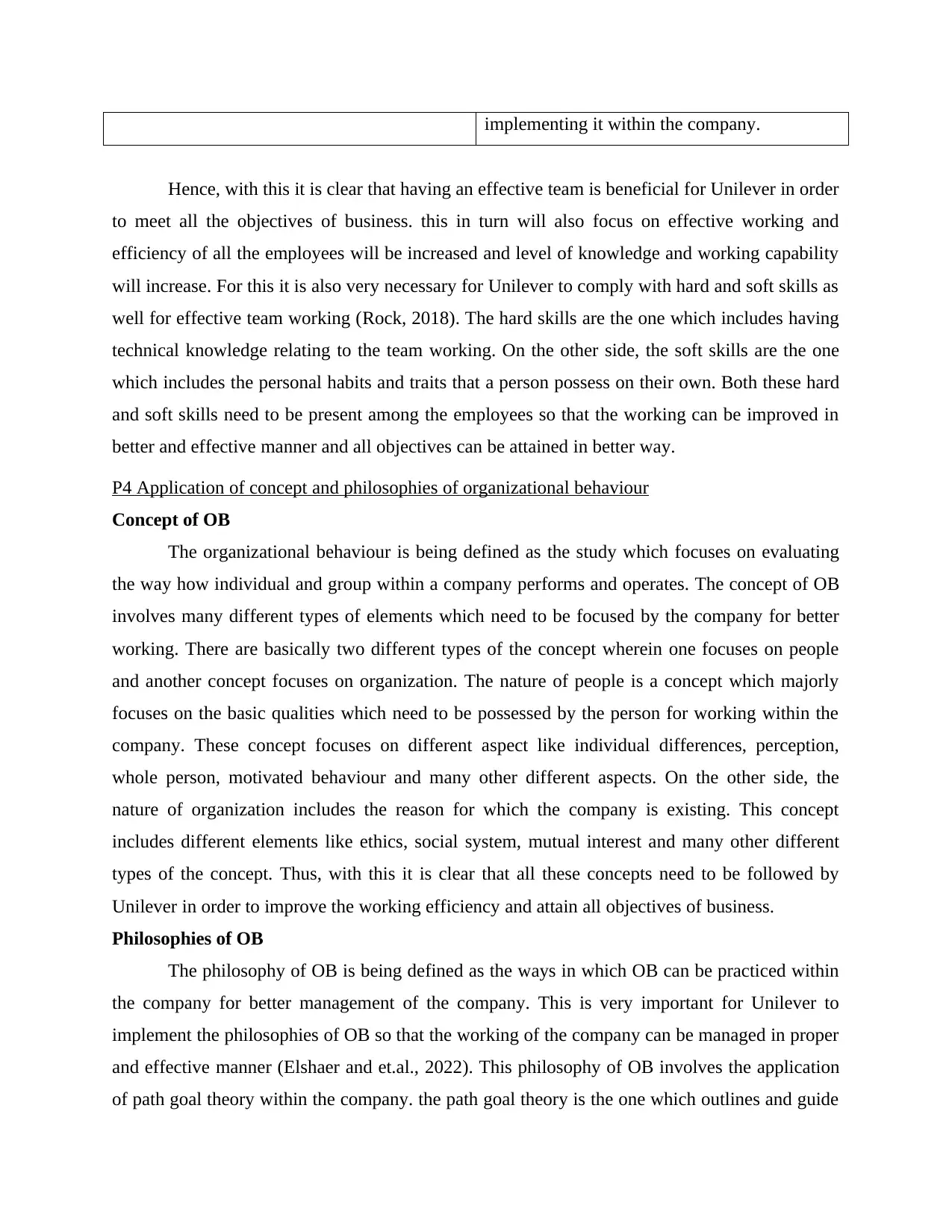
implementing it within the company.
Hence, with this it is clear that having an effective team is beneficial for Unilever in order
to meet all the objectives of business. this in turn will also focus on effective working and
efficiency of all the employees will be increased and level of knowledge and working capability
will increase. For this it is also very necessary for Unilever to comply with hard and soft skills as
well for effective team working (Rock, 2018). The hard skills are the one which includes having
technical knowledge relating to the team working. On the other side, the soft skills are the one
which includes the personal habits and traits that a person possess on their own. Both these hard
and soft skills need to be present among the employees so that the working can be improved in
better and effective manner and all objectives can be attained in better way.
P4 Application of concept and philosophies of organizational behaviour
Concept of OB
The organizational behaviour is being defined as the study which focuses on evaluating
the way how individual and group within a company performs and operates. The concept of OB
involves many different types of elements which need to be focused by the company for better
working. There are basically two different types of the concept wherein one focuses on people
and another concept focuses on organization. The nature of people is a concept which majorly
focuses on the basic qualities which need to be possessed by the person for working within the
company. These concept focuses on different aspect like individual differences, perception,
whole person, motivated behaviour and many other different aspects. On the other side, the
nature of organization includes the reason for which the company is existing. This concept
includes different elements like ethics, social system, mutual interest and many other different
types of the concept. Thus, with this it is clear that all these concepts need to be followed by
Unilever in order to improve the working efficiency and attain all objectives of business.
Philosophies of OB
The philosophy of OB is being defined as the ways in which OB can be practiced within
the company for better management of the company. This is very important for Unilever to
implement the philosophies of OB so that the working of the company can be managed in proper
and effective manner (Elshaer and et.al., 2022). This philosophy of OB involves the application
of path goal theory within the company. the path goal theory is the one which outlines and guide
Hence, with this it is clear that having an effective team is beneficial for Unilever in order
to meet all the objectives of business. this in turn will also focus on effective working and
efficiency of all the employees will be increased and level of knowledge and working capability
will increase. For this it is also very necessary for Unilever to comply with hard and soft skills as
well for effective team working (Rock, 2018). The hard skills are the one which includes having
technical knowledge relating to the team working. On the other side, the soft skills are the one
which includes the personal habits and traits that a person possess on their own. Both these hard
and soft skills need to be present among the employees so that the working can be improved in
better and effective manner and all objectives can be attained in better way.
P4 Application of concept and philosophies of organizational behaviour
Concept of OB
The organizational behaviour is being defined as the study which focuses on evaluating
the way how individual and group within a company performs and operates. The concept of OB
involves many different types of elements which need to be focused by the company for better
working. There are basically two different types of the concept wherein one focuses on people
and another concept focuses on organization. The nature of people is a concept which majorly
focuses on the basic qualities which need to be possessed by the person for working within the
company. These concept focuses on different aspect like individual differences, perception,
whole person, motivated behaviour and many other different aspects. On the other side, the
nature of organization includes the reason for which the company is existing. This concept
includes different elements like ethics, social system, mutual interest and many other different
types of the concept. Thus, with this it is clear that all these concepts need to be followed by
Unilever in order to improve the working efficiency and attain all objectives of business.
Philosophies of OB
The philosophy of OB is being defined as the ways in which OB can be practiced within
the company for better management of the company. This is very important for Unilever to
implement the philosophies of OB so that the working of the company can be managed in proper
and effective manner (Elshaer and et.al., 2022). This philosophy of OB involves the application
of path goal theory within the company. the path goal theory is the one which outlines and guide
Paraphrase This Document
Need a fresh take? Get an instant paraphrase of this document with our AI Paraphraser
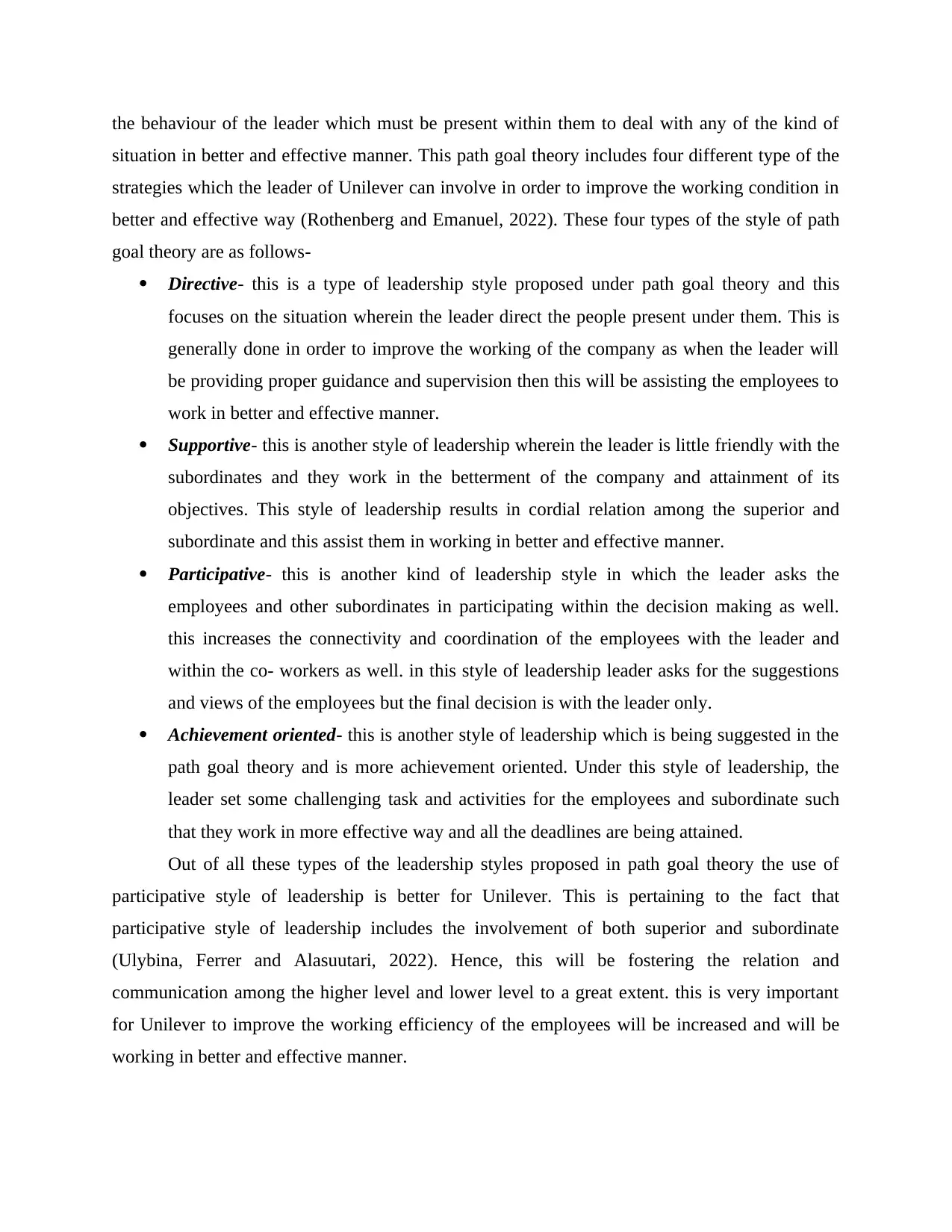
the behaviour of the leader which must be present within them to deal with any of the kind of
situation in better and effective manner. This path goal theory includes four different type of the
strategies which the leader of Unilever can involve in order to improve the working condition in
better and effective way (Rothenberg and Emanuel, 2022). These four types of the style of path
goal theory are as follows-
Directive- this is a type of leadership style proposed under path goal theory and this
focuses on the situation wherein the leader direct the people present under them. This is
generally done in order to improve the working of the company as when the leader will
be providing proper guidance and supervision then this will be assisting the employees to
work in better and effective manner.
Supportive- this is another style of leadership wherein the leader is little friendly with the
subordinates and they work in the betterment of the company and attainment of its
objectives. This style of leadership results in cordial relation among the superior and
subordinate and this assist them in working in better and effective manner.
Participative- this is another kind of leadership style in which the leader asks the
employees and other subordinates in participating within the decision making as well.
this increases the connectivity and coordination of the employees with the leader and
within the co- workers as well. in this style of leadership leader asks for the suggestions
and views of the employees but the final decision is with the leader only.
Achievement oriented- this is another style of leadership which is being suggested in the
path goal theory and is more achievement oriented. Under this style of leadership, the
leader set some challenging task and activities for the employees and subordinate such
that they work in more effective way and all the deadlines are being attained.
Out of all these types of the leadership styles proposed in path goal theory the use of
participative style of leadership is better for Unilever. This is pertaining to the fact that
participative style of leadership includes the involvement of both superior and subordinate
(Ulybina, Ferrer and Alasuutari, 2022). Hence, this will be fostering the relation and
communication among the higher level and lower level to a great extent. this is very important
for Unilever to improve the working efficiency of the employees will be increased and will be
working in better and effective manner.
situation in better and effective manner. This path goal theory includes four different type of the
strategies which the leader of Unilever can involve in order to improve the working condition in
better and effective way (Rothenberg and Emanuel, 2022). These four types of the style of path
goal theory are as follows-
Directive- this is a type of leadership style proposed under path goal theory and this
focuses on the situation wherein the leader direct the people present under them. This is
generally done in order to improve the working of the company as when the leader will
be providing proper guidance and supervision then this will be assisting the employees to
work in better and effective manner.
Supportive- this is another style of leadership wherein the leader is little friendly with the
subordinates and they work in the betterment of the company and attainment of its
objectives. This style of leadership results in cordial relation among the superior and
subordinate and this assist them in working in better and effective manner.
Participative- this is another kind of leadership style in which the leader asks the
employees and other subordinates in participating within the decision making as well.
this increases the connectivity and coordination of the employees with the leader and
within the co- workers as well. in this style of leadership leader asks for the suggestions
and views of the employees but the final decision is with the leader only.
Achievement oriented- this is another style of leadership which is being suggested in the
path goal theory and is more achievement oriented. Under this style of leadership, the
leader set some challenging task and activities for the employees and subordinate such
that they work in more effective way and all the deadlines are being attained.
Out of all these types of the leadership styles proposed in path goal theory the use of
participative style of leadership is better for Unilever. This is pertaining to the fact that
participative style of leadership includes the involvement of both superior and subordinate
(Ulybina, Ferrer and Alasuutari, 2022). Hence, this will be fostering the relation and
communication among the higher level and lower level to a great extent. this is very important
for Unilever to improve the working efficiency of the employees will be increased and will be
working in better and effective manner.
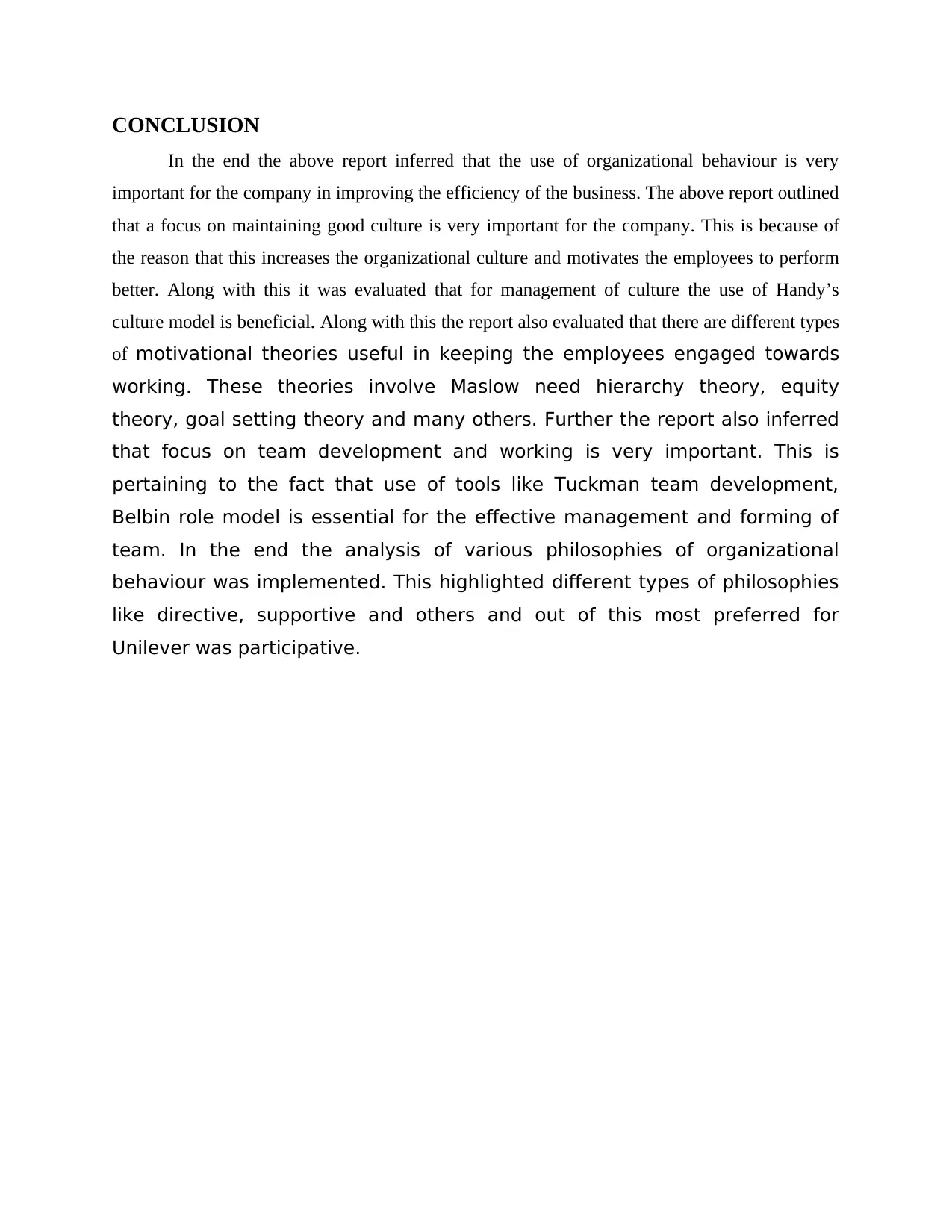
CONCLUSION
In the end the above report inferred that the use of organizational behaviour is very
important for the company in improving the efficiency of the business. The above report outlined
that a focus on maintaining good culture is very important for the company. This is because of
the reason that this increases the organizational culture and motivates the employees to perform
better. Along with this it was evaluated that for management of culture the use of Handy’s
culture model is beneficial. Along with this the report also evaluated that there are different types
of motivational theories useful in keeping the employees engaged towards
working. These theories involve Maslow need hierarchy theory, equity
theory, goal setting theory and many others. Further the report also inferred
that focus on team development and working is very important. This is
pertaining to the fact that use of tools like Tuckman team development,
Belbin role model is essential for the effective management and forming of
team. In the end the analysis of various philosophies of organizational
behaviour was implemented. This highlighted different types of philosophies
like directive, supportive and others and out of this most preferred for
Unilever was participative.
In the end the above report inferred that the use of organizational behaviour is very
important for the company in improving the efficiency of the business. The above report outlined
that a focus on maintaining good culture is very important for the company. This is because of
the reason that this increases the organizational culture and motivates the employees to perform
better. Along with this it was evaluated that for management of culture the use of Handy’s
culture model is beneficial. Along with this the report also evaluated that there are different types
of motivational theories useful in keeping the employees engaged towards
working. These theories involve Maslow need hierarchy theory, equity
theory, goal setting theory and many others. Further the report also inferred
that focus on team development and working is very important. This is
pertaining to the fact that use of tools like Tuckman team development,
Belbin role model is essential for the effective management and forming of
team. In the end the analysis of various philosophies of organizational
behaviour was implemented. This highlighted different types of philosophies
like directive, supportive and others and out of this most preferred for
Unilever was participative.
⊘ This is a preview!⊘
Do you want full access?
Subscribe today to unlock all pages.

Trusted by 1+ million students worldwide
1 out of 14
Related Documents
Your All-in-One AI-Powered Toolkit for Academic Success.
+13062052269
info@desklib.com
Available 24*7 on WhatsApp / Email
![[object Object]](/_next/static/media/star-bottom.7253800d.svg)
Unlock your academic potential
Copyright © 2020–2026 A2Z Services. All Rights Reserved. Developed and managed by ZUCOL.




